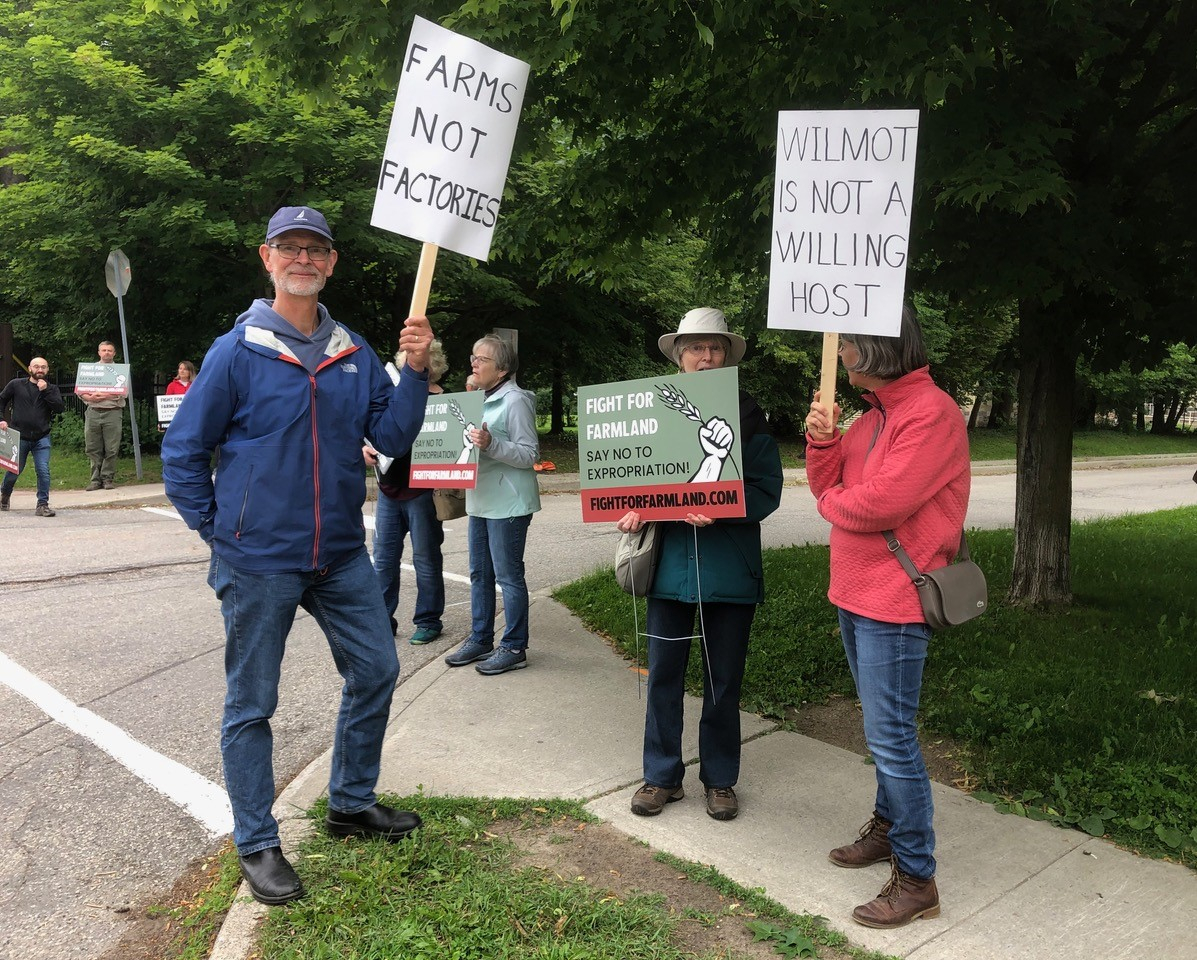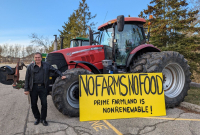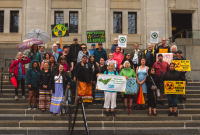Support strong Canadian climate journalism for 2025
As the conflict intensifies between farmers, landowners and the Region of Waterloo over expropriation of 310 hectares of land for an undisclosed industrial project, the region remains determined to keep the project under wraps.
A group of concerned citizens filed 21 Freedom of Information requests with the regional municipality. Of those, 18 were “denied entirely,” according to Fight for Farmland, a group representing residents and landowners against the proposed industrial development in the township.
The group says it has also been denied access to “documents, meeting notes, emails, and transcripts” related to the project.
“It is very concerning to see the lack of response to these basic questions about this proposed industrial mega-site and its impacts on the surrounding communities,” said Alfred Lowrick, spokesperson for the Fight For Farmland group, in a press release shared with Canada’s National Observer. “We have to wonder what the Region is hiding and if they have even done the needed investigations, studies, and research for this massive proposal that will have such huge impacts.”
The group argues that the region's denial of these requests raises serious concerns about transparency and legality.
“Is the Region withholding this information because critical steps in the land acquisition process have not been taken? Why are they keeping constituents and citizens in the dark?,” reads the group's statement.
Media requests have also been denied. Despite multiple attempts by Canada’s National Observer to obtain information on the project, the Region of Waterloo chair and councillors, as well as their counterparts in Wilmot Township, refuse to disclose details of the project, citing the Municipal Act, which keeps closed-session discussions confidential. All decisions about the land selection process have been made behind closed doors.
The advocacy group says their Freedom of Information requests included:
- Request for details on alternative sites evaluated, if other locations were considered for this industrial project.
- Inquiry into discussions about the project’s compliance with the Regional Official Plan’s commitment to protect farmland.
- A copy of any non-disclosure agreements, details of signatories, and penalties for breach. Also, clarification on the claim that no NDA existed and that discussions were held in in-camera meetings protected by the Municipal Act.
- Information on the capacity and impact on local wastewater treatment facilities.
- Studies on the impact on local drinking water resources.
- Details on transportation infrastructure planning and studies.
- Inquiry into cost estimates for required road upgrades, water and wastewater treatment plant upgrades, rail improvements, and other required infrastructure improvements requiring significant capital investments.
Kevin Thomason, vice-chair of the Grand River Environmental Network, another group opposed to the secretive project, said it is confounding that the Region continues to refuse to answer even the most basic questions and address so many of the community’s concerns.
“According to the legal experts we have consulted so far, it is very unusual for simple Freedom of Information requests such as this to be completely denied by governments,” Thomason said. “It certainly isn’t in the best public interest to see so much secrecy and important information such as studies and research that has been paid for with tax dollars withheld from the public. Unless those studies haven’t been done and there’s nothing to share.”
In a statement in response to questions from Canada’s National Observer, the Region of Waterloo explained that the denial of information requests is rooted in the need to maintain confidentiality during real estate negotiations.
“Conversations with landowners remain confidential, which is common practice in professional real estate negotiations,” the regional government’s statement read. “MFIPPA [Municipal Freedom of Information and Protection of Privacy Act] protects this information to protect the interests of all parties involved. We remain committed to sharing more information as we are able and the project progresses.”
However, text of the municipal freedom of information law specifically names reports like environmental impact statements, field research reports, budgetary estimates and more, as not the kinds of items that can be withheld — even if presented behind closed doors. The law also makes broad exceptions for cases where “a compelling public interest in the disclosure of the record clearly outweighs the purpose of the exemption.”
On its website, the Region of Waterloo says the land assembly is intended to “create a large-scale, shovel-ready site that is attractive to a major employer. This initiative aims to secure generational investment that will result in thousands of well-paying local jobs and further economic prosperity in Waterloo Region.”
The site selection process, the website says, focuses on features like large contiguous space, highway access, existing hydro and water infrastructure, and proximity to a skilled workforce and educational institutions. The region says the assembly is not for any specific business, but that it’s intended to attract a major business in the future.
After months of silence, last month two Wilmot Township councillors, Kris Wilkinson and Harvir Sidhu, expressed concerns about the process and called for greater transparency from the Region of Waterloo to release technical details of the project.
The Fight for Farmland group is challenging the region's secretive attempt to assemble and potentially expropriate prime agricultural land. “The Region has conducted these actions in secrecy, without a single public meeting, and contradicting long-established plans and planning concepts in the Region's Official Plan,” reads the group's statement.
The group launched an online petition that has garnered over 38,000 signatures. They are calling for an immediate halt to the expropriation, arguing that the "forced acquisition" by the Region of Waterloo would severely impact Ontario's food security, farmers' livelihoods and the environmental well-being of the community.






Comments